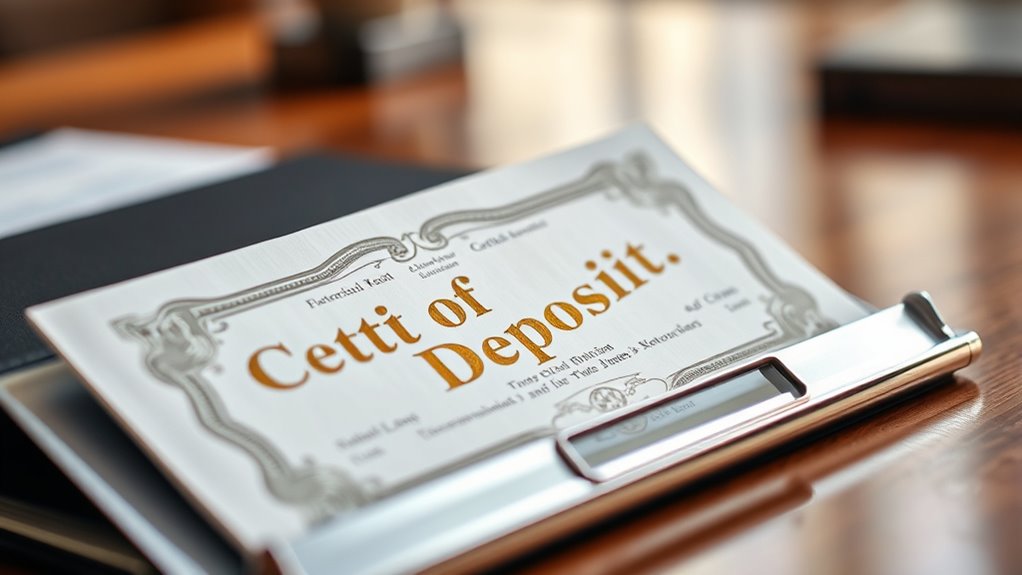A certificate of deposit (CD) is a fixed-term savings account where you deposit a lump sum with a bank or credit union for a set period, earning a guaranteed interest rate. When you hold it to maturity, your principal and interest are protected, making it a safe choice. If you want to learn more about how CDs can help meet your savings goals, keep exploring further details.
Key Takeaways
- Certificates of Deposit (CDs) are low-risk savings products with fixed interest rates and set terms ranging from months to years.
- They guarantee the principal and a specific return at maturity, insured up to $250,000 by FDIC or NCUA.
- CDs require depositing a lump sum and typically involve penalties for early withdrawal, which can reduce earnings.
- They offer higher interest rates than regular savings accounts, making them suitable for disciplined savers seeking stable growth.
- Compared to savings and money market accounts, CDs have less flexibility but provide predictable returns and safety.

A certificate of deposit (CD) is a low-risk savings option that offers a fixed interest rate and a set term, typically ranging from three months to several years. When you open a CD, you deposit a lump sum into an account at a bank or credit union, agreeing to leave the money untouched until the maturity date. This arrangement locks in your principal and guarantees a specific return, which is paid out as a lump sum when the CD matures. The interest rate remains fixed throughout the term, providing predictability and making it easy to plan your finances. Because of this stability, CDs are ideal for conservative savers who want to earn higher returns than regular savings accounts without exposing their funds to market risk.
Your principal is protected, and most CDs are insured up to $250,000 by the FDIC or NCUA, ensuring your money stays safe even if the institution faces financial trouble. However, this safety comes with a caveat: if you withdraw funds before the maturity date, you’ll face an early withdrawal penalty. Typically, this penalty ranges from three to twelve months of interest, which can appreciably reduce your earnings or even erode your principal in some cases. Because of these restrictions, CDs are best suited for savings goals where you don’t need immediate access to your funds, such as saving for a future purchase or building an emergency fund you won’t touch for a set period.
Most CDs are FDIC or NCUA insured up to $250,000, but early withdrawals can erode your principal through penalties.
Once your CD reaches its maturity, you can withdraw the full amount, including interest, or choose to roll it into a new CD. Rolling over allows your savings to continue earning a fixed rate without interruption. Keep in mind that the interest earned is paid out as a lump sum at maturity unless the bank offers specific options for periodic payments. The fixed rate and set term make CDs a predictable investment, but they may not keep pace with inflation, which can slightly diminish your purchasing power over time. Because of the penalty for early withdrawal, you should consider CDs as a medium- to long-term savings vehicle rather than a liquid emergency fund.
Additionally, understanding the interest rate environment can help you decide the best time to lock in a rate that suits your financial goals. Compared to other savings products, CDs generally offer higher interest rates than traditional savings or money market accounts, but less flexibility. Savings accounts allow more frequent access without penalty, while money market accounts may offer check-writing and debit card access, but with lower rates. CDs are an excellent choice if you’re looking for a safe, predictable way to grow your savings with minimal effort. With terms ranging from a few months to several years and competitive rates up to 4.50% APY in recent years, CDs remain a popular option for disciplined savers seeking stability and higher returns.
best certificates of deposit 6 month
As an affiliate, we earn on qualifying purchases.
As an affiliate, we earn on qualifying purchases.
Frequently Asked Questions
Can I Withdraw Funds From a CD Before Maturity Without Penalty?
You generally can’t withdraw funds from a CD before maturity without penalty. If you try, you’ll likely face a penalty fee, which might be a certain number of months’ interest or more. Some banks offer special CDs with minimal or no penalties, so check your specific account terms. To avoid penalties, plan your withdrawals around the maturity date or consider other savings options that offer more flexibility.
How Do Interest Rates on CDS Compare to Savings Accounts?
Interest rates on CDs are usually much higher than savings accounts, making them a smart choice if you want your money to grow faster. You might see rates double or even triple those of regular savings accounts, helping your savings skyrocket. However, remember that locking your money in a CD means you can’t access it without penalties until it matures. So, choose a CD when you’re sure you won’t need quick access to your funds.
Are There Penalties for Early Withdrawal From a CD?
Yes, there are penalties for early withdrawal from a CD. If you decide to take out your money before the maturity date, you typically face a penalty that often involves forfeiting some or all of the interest earned. The exact penalty varies depending on the bank or credit union and the terms of your CD. Always read the agreement carefully before investing, so you’re aware of potential penalties if you need access to your funds early.
What Happens if a Bank Offering a CD Fails?
Think of a failed bank like a sinking ship; your deposits might be at risk. If a bank offering a CD fails, your funds are protected up to $250,000 by the FDIC. You may receive your insured amount quickly, but any amount exceeding that could be lost or delayed. It’s essential to stay informed about bank stability and keep your investments within insured limits to safeguard your money.
Can I Add Funds to an Existing CD After Opening?
You generally can’t add funds to an existing CD after opening it. Most banks set the deposit amount at the start, and the terms don’t allow further contributions until maturity. If you want to invest more later, you’ll need to open a new CD. However, some banks offer special “add-on” CDs, so check with your bank to see if that’s an option.

Unclaimed Assets: Money the Government Owes You! EZ E-Guide (Unclaimed Bank Accounts, CDs and Safe Deposit Boxes Book 2)
As an affiliate, we earn on qualifying purchases.
As an affiliate, we earn on qualifying purchases.
Conclusion
Now that you understand Certificates of Deposit, you’re armed with a powerful tool to grow your savings securely. Think of CDs as your financial fortress, protecting your money while earning interest. Don’t let your hard-earned cash sit idle—seize this opportunity to make it work for you! With a little patience, your investment can blossom into something truly extraordinary. Start exploring CDs today and watch your financial future shine brighter than ever before!
high yield fixed deposit savings account
As an affiliate, we earn on qualifying purchases.
As an affiliate, we earn on qualifying purchases.
CD rollover options
As an affiliate, we earn on qualifying purchases.
As an affiliate, we earn on qualifying purchases.









